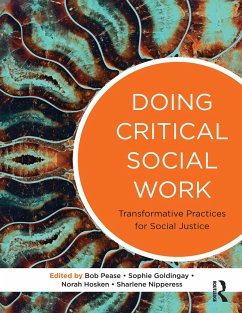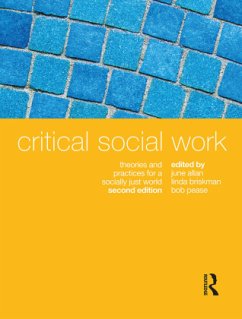
The Routledge Handbook of Critical Social Work
Versandkostenfrei!
Versandfertig in 6-10 Tagen
256,99 €
inkl. MwSt.
Weitere Ausgaben:

PAYBACK Punkte
128 °P sammeln!
The Routledge Handbook of Critical Social Work brings together the world's leading scholars in the field to provide a cutting-edge overview of classic and current research and future trends in the subject.Comprised of 48 chapters divided into six parts:Historical, social, and political influencesMapping the theoretical and conceptual terrainMethods of engagement and modes of analysisCritical contexts for practice and policyProfessional education and socialisationFuture challenges, directions, and transformationsit provides an authoritative guide to theory and method, and the primary debates of...
The Routledge Handbook of Critical Social Work brings together the world's leading scholars in the field to provide a cutting-edge overview of classic and current research and future trends in the subject.
Comprised of 48 chapters divided into six parts:
Historical, social, and political influences
Mapping the theoretical and conceptual terrain
Methods of engagement and modes of analysis
Critical contexts for practice and policy
Professional education and socialisation
Future challenges, directions, and transformations
it provides an authoritative guide to theory and method, and the primary debates of today in social work from a critical perspective.
This handbook is a major reference work and the first book to comprehensively map the wide-ranging territory of critical social work. It does so by addressing its conceptual developments, its methodological advances, its value-based front-line practice and as an influence on the policy field. By offering a definitive survey of current academic knowledge as it relates to professional practice, it provides the first comprehensive, up-to-date, definitive work of reference while at the same time identifying emerging, innovative and cutting-edge areas.
Comprised of 48 chapters divided into six parts:
Historical, social, and political influences
Mapping the theoretical and conceptual terrain
Methods of engagement and modes of analysis
Critical contexts for practice and policy
Professional education and socialisation
Future challenges, directions, and transformations
it provides an authoritative guide to theory and method, and the primary debates of today in social work from a critical perspective.
This handbook is a major reference work and the first book to comprehensively map the wide-ranging territory of critical social work. It does so by addressing its conceptual developments, its methodological advances, its value-based front-line practice and as an influence on the policy field. By offering a definitive survey of current academic knowledge as it relates to professional practice, it provides the first comprehensive, up-to-date, definitive work of reference while at the same time identifying emerging, innovative and cutting-edge areas.














